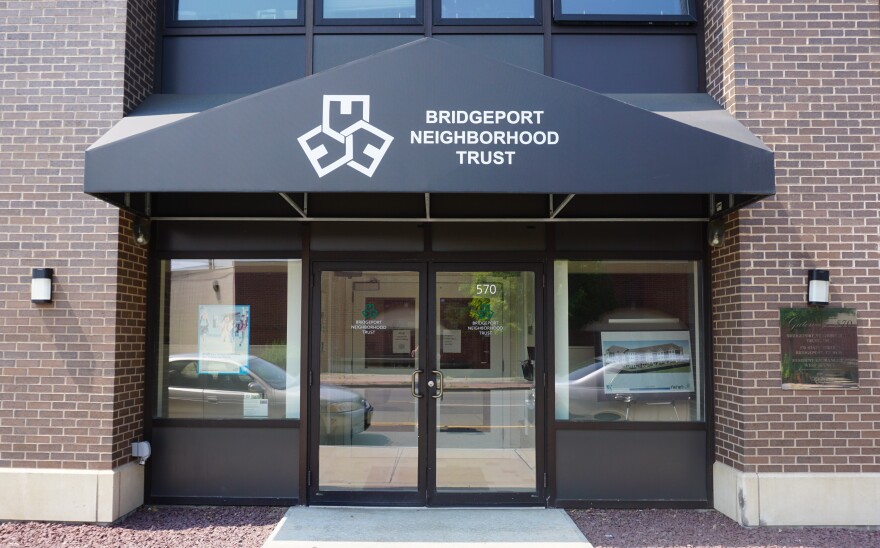Prior to the pandemic, Bridgeport resident Hernandez was the sole breadwinner for this then-family of three. Hernandez, who asked to be identified by his last name only, was a full-time driver for the rideshare company Uber.
But that was cut short as soon as COVID started to spread through the state. When Hernandez found out his wife was pregnant, he made the difficult decision to stop working.
“With COVID, someone could easily get sick and die. And with Uber, you never know who’s getting in your car. I didn’t want to lose my family,” Hernandez said in Spanish.
Hernandez, like many others in the same position, tried to find other ways to stay afloat. But he quickly found himself choosing between paying his rent or providing other basic necessities for his family.
“I asked God to bless me because I didn’t have money to pay the rent,” Hernandez said. “I was desperate.”
After several letters from his landlord, he said he was scared his family might be evicted.
But when he received a call from the organization Building Neighborhoods Together (BNT), he said he felt a spark of hope. BNT, formerly known as Bridgeport Neighborhood Trust, is a HUD-approved housing counseling agency in Bridgeport, and one of the state’s partners heading rental relief efforts in the area. Hernandez had made it to the top of the calling list after requesting assistance from the state’s Department of Housing.

“In the beginning, he was really stressed not knowing how to deal with the situation,” said Carmen Romos, the intake specialist who made the call. “With COVID, being behind on rent, and being his household’s provider was very hard on him,” she said.
At the time Hernandez received the call, he was five months behind on his rent.
“He initially thought that even though he would apply, there was no solution to his problem,” Ramos said. “But I reassured him that I was there to help.”
Ramos first helped Hernandez apply to the Temporary Rental Housing Assistance Program. THRAP, launched by the state in June of 2020, is now on pause. The $40 million program was funded through the CARES Act’s Coronavirus Relief Fund. The application required Hernandez sign paperwork that could not be completed online.
“When I called him and he got the application, he was having a hard time even printing. He didn't have a printer,” Ramos said.
But they didn’t allow that to be an obstacle, she added. She printed all the necessary documents, made copies for Hernandez and even reached out to his landlord to encourage participation.
“He hesitated a little bit not knowing it was a new program. It's hard to believe a program would pay back rent. The landlord was concerned about their personal situation and not being able to pay his bills and mortgage as well,” Ramos said.
But with a bit of reassurance, the landlord agreed to take part. And the application was submitted.
About three months later, Hernandez was approved for $4,000.
“It was helpful,” Hernandez said. “But it wasn’t enough.”
Seven months after the first aid, Hernandez once again found himself troubled by debt.
“It was piling up even more. We called Carmen again for help,” Hernandez said.
The second time around, Ramos advised them to apply for , the state’s second federally funded rental relief program. This time the application was completely online and in Spanish.
But Hernandez told Ramos he wasn’t confident navigating the application on his own.
And that hesitancy isn’t uncommon among clients. While some struggle with language barriers, others wrestle with technology.
All in all, Ramos said the key to her work is building trust.
“It's the tone of how you talk to people. How you treat them and make them feel like you care,” Ramos said. “Once he felt comfortable, he knew he could ask for help whenever he needed.”
Hernandez is just one of 800 clients in need of rental assistance that have crossed Ramos’ desk in the last 10 months. And his case exemplifies why it’s important for her to go the extra mile, she said.
“How anxious and hesitant they feel often makes it harder to take that first step,” Ramos added. “But once they do it makes a big difference.”
Hernandez was approved for $8,300 through Unite CT and is once again up-to-date on his rent. He is not yet comfortable going back to work with a newborn in the house, but he said he’ll work it out.
“If it wasn’t for BNT and Carmen, my family and I could have ended up on the streets,” Hernandez said. “I am beyond grateful.”




